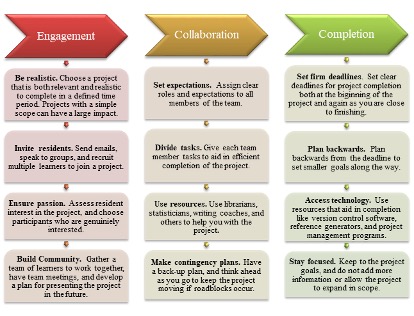Involving Residents in Scholarly Activity
by Thomas Hahn, MD, Jensena Carlson, MD, and Sarina Schrager, MD, MS, University of Wisconsin Department of Family Medicine and Community Health, Madison, WI.
The Accreditation Council for Graduate Medical Education requires all residents to participate in scholarly activity 1. Residency faculty are also often required to do scholarly work for their positions and for promotion. Benefits of involving residents in scholarly activity include bolstering evidence-based medicine skills, improving overall satisfaction with residency, and increasing faculty productivity.2,3 However, common barriers to doing scholarly work include lack of time, resources, and mentors.4
As part of a faculty development workshop, we held a 2-hour workshop for our residency faculty, and also included several residents (25 faculty, 7 residents), to discuss a three-phase approach to involving residents in scholarly activity: engagement, collaboration, and completion.
During the workshop we divided into small working groups of about 10 people to discuss and identify key steps for each phase. Engagement was the initial phase of selecting a realistic project and recruiting and building a team. Collaboration involved working together to execute the project by setting clear expectations, dividing the workload, and using resources and contingency plans to make progress. Finally, completion required sticking to firm deadlines, remembering the overall goals, and using technology to assist in finishing the project.
In Figure 1, we present lessons learned from the workshop. We plan to use this structured approach as a guide for faculty, especially new faculty, to involve residents in scholarly work in an organized, efficient, and meaningful way. A similar approach can be used by other institutions looking to enhance scholarly activity for their learners.
Figure 1

References
- Accreditation Council for Graduate Medical Education. Specialty-specific references for DIOs: Resident/fellow scholarly activity ACGME. https://www.acgme.org/Portals/0/PDFs/Specialty-specific%20Requirement%20Topics/DIO-Scholarly_Activity_Resident-Fellow.pdf?ver=2018-06-29-082335-797. Updated June 2018. Accessed January 31, 2020.
- Smith, M. Research in residency: Do research curricula impact post-residency practice? Fam Med. 2005;37(5):322-327.
- Takahashi O, Ohde S, Jacobs, JL, Tokuda Y, Omata F, Fukui T. Residents’ experience of scholarly activities is associated with higher satisfaction with residency training. J Gen Intern Med. 2009;24(9): 716-720.
- Wood W, McCollum J, Kukreia P, Vetter IL, Morgan CJ, Hossein Zadeh Maleki A, et al. Graduate medical education scholarly activity initiatives: A systematic review and meta-analysis. BMC Med Educ. 2018;18:318. doi: 10.1186/s12909-018-1407-8.
